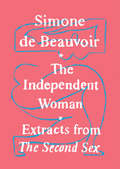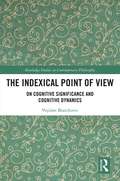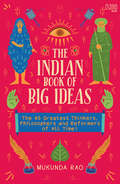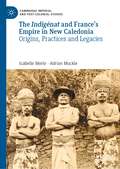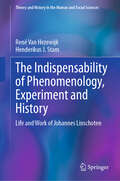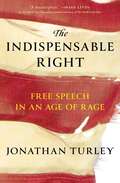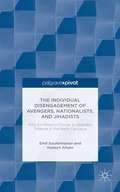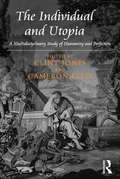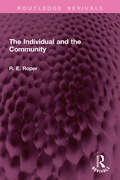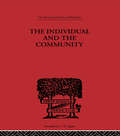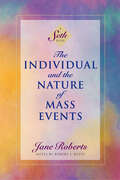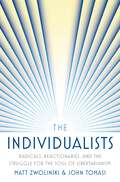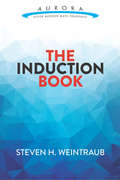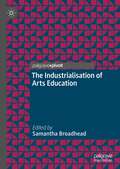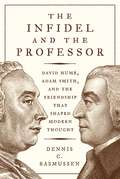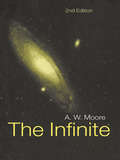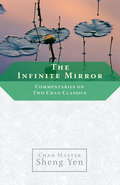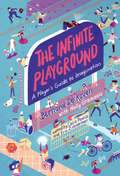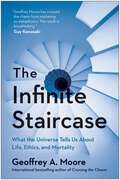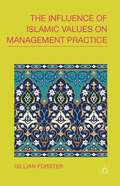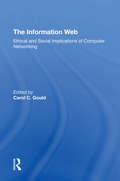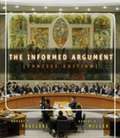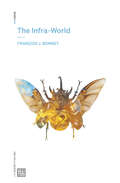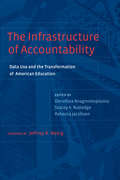- Table View
- List View
The Independent Woman: Extracts from The Second Sex
by Simone De Beauvoir“Like man, woman is a human being.” When The Second Sex was first published in Paris in 1949—groundbreaking, risqué, brilliantly written and strikingly modern—it provoked both outrage and inspiration. The Independent Woman contains three key chapters of Beauvoir’s masterwork, which illuminate the feminine condition and identify practical social reforms for gender equality. It captures the essence of the spirited manifesto that switched on light bulbs in the heads of a generation of women and continues to exert profound influence on feminists today.
The Indexical Point of View: On Cognitive Significance and Cognitive Dynamics (Routledge Studies in Contemporary Philosophy)
by Vojislav BozickovicThis book argues that there is a common cognitive mechanism underlying all indexical thoughts, in spite of their seeming diversity. Indexical thoughts are mental representations, such as beliefs and desires. They represent items from a thinker's point of view or her cognitive perspective. We typically express them by means of sentences containing linguistic expressions such as 'this (F)' or 'that (F)', adverbs like 'here', 'now', and 'today', and the personal pronoun ‘I’. While generally agreeing that representing the world from a thinker's cognitive perspective is a key feature of indexical thoughts, philosophers disagree as to whether a thinker's cognitive perspective can be captured and rationalized by semantic content and, if so, what kind of content this is. This book surveys competing views and then advances its own positive account. Ultimately, it argues that a thinker's cognitive perspective - or her indexical point of view - is to be explained in terms of the content that is believed and asserted as the only kind of content that there is which thereby serves as the bearer of cognitive significance. The Indexical Point of View will be of interest to philosophers of mind and language, linguists, and cognitive scientists.
The Indian Book of Big Ideas: The 45 Greatest Thinkers, Philosophers and Reformers of All Time!
by Mukunda RaoWho are we?Is everything in the world connected?Is truth different for different people?Does God speak to only some of us?Great minds have forever been engaged in tackling life's big questions. People travelled far and wide in search of answers, learned from others and came up with new ways of understanding the world. Curious to know what on earth they were thinking? Now you can walk down the winding path of philosophy from 700 BCE to recent times, discovering the wisdom and teachings of 45 great thinkers, philosophers and reformers of India. Learn from the most far-sighted luminaries, such as Mahavira, Gargi, Adi Shankara, Kabir, the Buddha, Vivekananda and Guru Nanak, along with Sri Aurobindo, Rammohan Roy, Rabindranath Tagore and Mahatma Gandhi, and get to know how the most brilliant and influential Indian ideas were born. These thinkers, you will see, didn't always agree with each other (indeed, they sometimes fiercely disagreed!), but all of them left behind a legacy of courage and compassion that remains valuable even today.
The Indigénat and France’s Empire in New Caledonia: Origins, Practices and Legacies (Cambridge Imperial and Post-Colonial Studies)
by Isabelle Merle Adrian MuckleThis book provides a long history of France’s infamous indigénat regime, from its origins in Algeria to its contested practices and legacies in France’s South Pacific territory of New Caledonia. The term indigénat is synonymous throughout the francophone world with the rigours and injustices of the colonial era under French rule. The indigénat regime or 'Native Code' governed the lives of peoples classified as French 'native' subjects in colonies as diverse as Algeria, West Africa, Madagascar, Indochina and New Caledonia. In New Caledonia it was introduced by decree in 1887 and remained in force until Kanak — New Caledonia’s indigenous people — obtained citizenship in 1946. Among the colonial tools and legal mechanisms associated with France’s colonial empire it is the one that has had the greatest impact on the memory of the colonized. Focussing on New Caledonia, the last remaining part of overseas France to have experienced the full force of the indigénat, this book illustrates the way that certain measures were translated into colonial practices, and sheds light on the tensions involved in the making of France as both a nation and a colonial empire. The first book to provide a comprehensive history of the indigénat regime, explaining how it first came into being and survived up until 1946 despite its constant denunciation, this is an important contribution to French Imperial History and Pacific History.
The Indispensability of Phenomenology, Experiment and History: Life and Work of Johannes Linschoten (Theory and History in the Human and Social Sciences)
by Henderikus J. Stam René Van HezewijkThis book is the first comprehensive intellectual biography of Johannes Linschoten, whose work has been credited with helping to bring down the Utrecht School of phenomenological psychology. The authors show this to be a mistaken assumption in the light of Linschoten’s entire oeuvre and demonstrate his importance for an understanding of a phenomenological psychology that necessarily coexists with an experimental, scientific psychology. In the Netherlands, Linschoten is particularly appreciated for his last book, published posthumously. That volume, Idols of the Psychologist, took a critical look at phenomenological psychology and its pretensions while simultaneously acknowledging that a phenomenological outlook is a necessity for beginning any kind of experimental investigation. Most commentators on this book considered Linschoten a convert from phenomenology to experimental psychology, but have either ignored his earlier, substantive work or have not seen the importance of the intellectual context for his final work. By examining his life and the full extent of his voluminous writings, this book demonstrates Linschoten’s importance for the development of psychology in the Netherlands and beyond. It will shed new light on the life and work of Johannes Linschoten as well as the Dutch school of phenomenology and its postwar contributions to psychology in Europe and North America. Furthermore, for the first time, this book brings together important aspects of Linschoten’s life with his prodigious output. It demonstrates how his life and work created a unique psychology that deserves to be continued and developed.
The Indispensable Right: Free Speech in an Age of Rage
by Jonathan TurleyA &“timely and brilliant original&” (Michael B. Mukasey, former US attorney general) look at freedom of speech—our most basic right and the one that protects all the others.Free speech is a human right, and the free expression of thought is at the very essence of being human. The United States was founded on this premise, and the First Amendment remains the single greatest constitutional commitment to the right of free expression in history. Yet there is a systemic effort to bar opposing viewpoints on subjects ranging from racial discrimination to police abuse, from climate change to gender equity. These measures are reinforced by the public&’s anger and rage; flash mobs appear today with the slightest provocation. We all lash out against anyone or anything that stands against our preferred certainty. The Indispensable Right places the current attacks on free speech in their proper historical, legal, and political context. The Constitution and the Bill of Rights were not only written for times like these, but in a time like this. This country was born in an age of rage and for 250 years we have periodically lost sight of the value of free expression. The history of the struggle for free speech is the story of extraordinary people—nonconformists who refuse to yield to abusive authority—and here is a mosaic of vivid characters and controversies. Johnathan Turley &“has written a learned and bracing book, rigorously detailed and unfailingly evenhanded&” (The Wall Street Journal) showing us the unique dangers of our current moment. The alliance of academic, media, and corporate interests with the government&’s traditional wish to control speech has put us on an almost irresistible path toward censorship. The Indispensable Right is a &“magnum opus should be required reading for everyone who cares about free speech&” (Nadine Strossen, former president of the American Civil Liberties Union) that reminds us that we remain a nation grappling with the implications of free expression and with the limits of our tolerance for the speech of others. For rather than a political crisis, this is a crisis of faith.
The Individual Disengagement of Avengers, Nationalists, and Jihadists: Why Ex-Militants Choose to Abandon Violence in the North Caucasus
by Emil Souleimanov Huseyn AliyevThis studydetails the causes and contexts of individual disengagement of various types of militants - avengers, nationalists and jihadists - in Russia's North Caucasus region. It aims to considerably enhance our theoretical understanding of individual militants' incentives to abandon violence. "
The Individual and Utopia: A Multidisciplinary Study of Humanity and Perfection
by Clint Jones Cameron EllisCentral to the idea of a perfect society is the idea that communities must be strong and bound together with shared ideologies. However, while this may be true, rarely are the individuals that comprise a community given primacy of place as central to a strong communal theory. This volume moves away from the dominant, current macro-level theorising on the subject of identity and its relationship to and with globalising trends, focusing instead on the individual’s relationship with utopia so as to offer new interpretive approaches for engaging with and examining utopian individuality. Interdisciplinary in scope and bringing together work from around the world, The Individual and Utopia enquires after the nature of the utopian as citizen, demonstrating the inherent value of making the individual central to utopian theorizing and highlighting the methodologies necessary for examining the utopian individual. The various approaches employed reveal what it is to be an individual yoked by the idea of citizenship and challenge the ways that we have traditionally been taught to think of the individual as citizen. As such, it will appeal to scholars with interests in social theory, philosophy, literature, cultural studies, architecture, and feminist thought, whose work intersects with political thought, utopian theorizing, or the study of humanity or human nature.
The Individual and the Community (Routledge Revivals)
by Reginald E. RoperFirst published in 1922, The Individual and the Community is a simple statement of the principles which underlie human activities, and condition the combined efforts of two or more individuals: with a comparison of human and animal communities, a distinction between community and State, and a forecast of communal evolution. It is a handbook of human co-existence. This book will be of interest to students of philosophy.
The Individual and the Community: A Historical Analysis of the Motivating Factors Of Social Conduct (International Library of Philosophy)
by Wen Kwei LiaoFirst published in 2000. Routledge is an imprint of Taylor & Francis, an informa company.
The Individual and the Nature of Mass Events (A Seth Book)
by Jane RobertsFrom the Bestselling Author of Seth SpeaksSpeaking exclusively through Jane Roberts, Seth has repeatedly stressed the concept that we create our own reality according to our individual beliefs. But how do our realities merge and combine to form mass reactions such as the overthrow of governments, the birth of a new religion, wars, epidemics, earthquakes, and new periods of art, architecture, and technology?In this pioneering work, Seth explores the connection between personal beliefs and world events. He pinpoints the unconscious — and often negative — beliefs pervading science and religion, medicine and mythology, and offers thought-provoking reflections on Darwinism, Freudianism, religions, cults, and medical beliefs.With fascinating and inspiring implications, Seth asserts that the personal impulses we are often taught to see as dangerous, chaotic, or contradictory, are instead crucial to the best interests of the species and the natural world, for they lead us to live &“not only as loving caretakers but as partners with other species.&”&“Only people who trust their spontaneous impulses can be consciously wise enough to choose from a myriad of probable futures the most promising events….&” — Jane Roberts, Speaking for Seth
The Individualists: Radicals, Reactionaries, and the Struggle for the Soul of Libertarianism
by John Tomasi Matt ZwolinskiA sweeping history of libertarian thought, from radical anarchists to conservative defenders of the status quoLibertarianism emerged in the mid-nineteenth century with an unwavering commitment to progressive causes, from women’s rights and the fight against slavery to anti-colonialism and Irish emancipation. Today, this movement founded on the principle of individual liberty finds itself divided by both progressive and reactionary elements vying to claim it as their own. The Individualists is the untold story of a political doctrine continually reshaped by fierce internal tensions, bold and eccentric personalities, and shifting political circumstances.Matt Zwolinski and John Tomasi trace the history of libertarianism from its origins as a radical progressive ideology in the 1850s to its crisis of identity today. They examine the doctrine’s evolution through six defining themes: private property, skepticism of authority, free markets, individualism, spontaneous order, and individual liberty. They show how the movement took a turn toward conservativism during the Cold War, when the dangers of communism at home and abroad came to dominate libertarian thinking. Zwolinski and Tomasi reveal a history that is wider, more diverse, and more contentious than many of us realize.A groundbreaking work of scholarship, The Individualists uncovers the neglected roots of a movement that has championed the poor and marginalized since its founding, but whose talk of equal liberty has often been bent to serve the interests of the rich and powerful.
The Induction Book
by Steven H. WeintraubMathematical induction — along with its equivalents, complete induction and well-ordering, and its immediate consequence, the pigeonhole principle — constitute essential proof techniques. Every mathematician is familiar with mathematical induction, and every student of mathematics requires a grasp of its concepts. This volume provides an introduction and a thorough exposure to these proof techniques. Geared toward students of mathematics at all levels, the text is particularly suitable for courses in mathematical induction, theorem-proving, and problem-solving. The treatment begins with both intuitive and formal explanations of mathematical induction and its equivalents. The next chapter presents many problems consisting of results to be proved by induction, with solutions omitted to enable instructors to assign them to students. Problems vary in difficulty; the majority of them require little background, and the most advanced involve calculus or linear algebra. The final chapter features proofs too complicated for students to find on their own, some of which are famous theorems by well-known mathematicians. For these beautiful and important theorems, the author provides expositions and proofs. The text concludes with a helpful Appendix providing the logical equivalence of the various forms of induction.
The Industrialisation of Arts Education
by Samantha BroadheadThis book comprises the responses of a group of multi-disciplinary writers/ researchers/practitioners to the proposition that arts education in the twentyfirst century has become industrialised. Historical and contemporary examples of how arts education prepares students for working in industry are discussed to show how the expectations of educators, students and industry representatives do not always concur. The extent to which arts pedagogies have been informed by the agendas of the cultural industries as well as wider neoliberal ideologies are also considered. This leads to questions about the function and value of arts education. The debates expose tensions of producing students who are ‘industryready’ in an educational context that must, at the same time, consider other issues such as sustainability and widening participation. Writers, educators and researchers in vocational education, creative writing, jewellery design, animation, fashion branding and popular music investigate the complexities relating to this topic from their own diverse points of view.
The Infidel and the Professor: David Hume, Adam Smith, and the Friendship That Shaped Modern Thought
by Dennis C. RasmussenThe story of the greatest of all philosophical friendships—and how it influenced modern thoughtDavid Hume is widely regarded as the most important philosopher ever to write in English, but during his lifetime he was attacked as “the Great Infidel” for his skeptical religious views and deemed unfit to teach the young. In contrast, Adam Smith was a revered professor of moral philosophy, and is now often hailed as the founding father of capitalism. Remarkably, the two were best friends for most of their adult lives, sharing what Dennis Rasmussen calls the greatest of all philosophical friendships. The Infidel and the Professor is the first book to tell the fascinating story of the friendship of these towering Enlightenment thinkers—and how it influenced their world-changing ideas.The book follows Hume and Smith’s relationship from their first meeting in 1749 until Hume’s death in 1776. It describes how they commented on each other’s writings, supported each other’s careers and literary ambitions, and advised each other on personal matters, most notably after Hume’s quarrel with Jean-Jacques Rousseau. Members of a vibrant intellectual scene in Enlightenment Scotland, Hume and Smith made many of the same friends (and enemies), joined the same clubs, and were interested in many of the same subjects well beyond philosophy and economics—from psychology and history to politics and Britain’s conflict with the American colonies. The book reveals that Smith’s private religious views were considerably closer to Hume’s public ones than is usually believed. It also shows that Hume contributed more to economics—and Smith contributed more to philosophy—than is generally recognized.Vividly written, The Infidel and the Professor is a compelling account of a great friendship that had great consequences for modern thought.
The Infinite
by A. W. MooreAnyone who has pondered the limitlessness of space and time, or the endlessness of numbers, or the perfection of God will recognize the special fascination of this question. Adrian Moore's historical study of the infinite covers all its aspects, from the mathematical to the mystical.
The Infinite Mirror: Commentaries on Two Chan Classics
by Master Sheng YenHere is the inimitable Master Sheng Yen at his best, illuminating the ancient texts of the Chinese Zen tradition to show how wonderfully practical they really are, even for us today. The texts, written by two of the founders of the Ts'ao-tung sect of Chan Buddhism, are poems entitled Inquiry into Matching Halves and Song of the Precious Mirror Samadhi. Both emphasize the Chan view that wisdom is not separate from vexation, and both speak of the levels of awareness through which one must pass on the way to realization. Both are also works of Buddhist philosophy that can serve as guides to spiritual practice for anyone.
The Infinite Playground: A Player's Guide to Imagination
by Bernard De KovenIn his final work, a visionary game designer reveals how a surprising range of play-based experiences can unlock our imagination and help us capture the power of fun and delight.Bernard De Koven (1941-2018) was a pioneering designer of games and theorist of fun. He studied games long before the field of game studies existed. For De Koven, games could not be reduced to artifacts and rules; they were also about experiencing fun. This book, his last, is about the imagination: the imagination as a plaything, a gateway to wonder. The Infinite Playground extends a play-centered invitation to experience the power and delight unlocked by imagination. It offers a curriculum for playful learning, as De Koven guides the readers through a series of observations and techniques, interspersed with games.
The Infinite Staircase: What the Universe Tells Us About Life, Ethics, and Mortality
by Geoffrey MooreNAUTILUS BOOK AWARD GOLD MEDALIST — BODY, MIND, SPIRIT PRACTICES &“Combining an extraordinary range of scholarship with an accessible and entertaining writing style, The Infinite Staircase . . . provides a coherent and unified platform for a full human life.&” —Midwest Book Review In this bold new book, high-tech&’s best-known strategist makes a seminal contribution to the search for meaning in a secular era. Two questions fundamental to human existence have always been the metaphysical &“where do I fit in the grand scheme of things?&” and the ethical &“how should I behave?&” Religion is no longer a source of answers for many people, and nothing has replaced it. Moore uses his signature framework-based approach to answer these questions, taking us on an intellectual roller coaster ride through physics, chemistry, biology, the social sciences and the humanities. Along the way, he builds a metaphorical ladder that leads from the big bang to the need for ethical action in our daily lives. Combining an extraordinary range of scholarship with an accessible and entertaining writing style, The Infinite Staircase: What the Universe Tells Us About Life, Ethics, and Mortality provides a coherent and unified platform for a full human life.
The Influence of Islamic Values on Management Practice
by Gillian ForsterThe Influence of Islamic Values on Management Practice is a cultural study examining how Islamic values influence management practice. Using Morocco as a case study, and with academic research and actual business managers working in this context, the book explores and explains how national characteristics, including Islam, shape management practice
The Information Web: Ethical And Social Implications Of Computer Networking
by Carol C GouldThis book deals with the major ethical and social implications of computer networking and its technological development. In this book, a number of leading thinkers—philosophers, computer scientists and researchers—address some fundamental questions posed by the new technology.
The Informed Argument (Brief 6th Edition)
by Robert K. Miller Robert P. YagelskiFor those who don't want readings, the Brief Edition contains the rhetoric portion of The Informed Argument, 6th edition.
The Infra-World
by Francois J. BonnetTraversing philosophy and the human sciences, literature, cinema, and the visual arts, this book maps out a history where all is chaos, maelstrom, and fog. If perception and language objectivate the world, if imagination structures it, if knowledge orders it, then how can we describe, name, or even apprehend that which comes to pass when language is absent, when perception vacillates, and when knowledge eludes us? How can we say, show, or make known that which undermines and refutes the order of things, the supposedly immutable real, and the administration of the sensible?This book takes us on a quest that traverses philosophy and the human sciences, but also literature, cinema, and the visual arts. Not content with analysing the ordering power of our representations, in The Infra-World François J. Bonnet also interrogates the works of artists who have experienced and experimented with those moments when they crack open, giving way to anguish and vertigo. If perception is a sieve, what can be said of that which slips through its net, how does one speak of what escapes? What remains of unqualified perceptions, of vanishing sensations? Where do the indescribable, nocturnal fears hide, the horrors lurking behind closed eyes? What of the world beneath language and objectivated sensation? What of the infra-world?
The Infrastructure of Accountability: Data Use and the Transformation of American Education
by Jeffrey R. Henig Rebecca Jacobsen Dorothea Anagnostopoulos Stacey A. RutledgeThe Infrastructure of Accountability brings together leading and emerging scholars who set forth an ambitious conceptual framework for understanding the full impact of large-scale, performance-based accountability systems on education. Over the past 20 years, schools and school systems have been utterly reshaped by the demands of test-based accountability. Interest in large-scale performance data has reached an unprecedented high point. Yet most education researchers focus primarily on questions of data quality and the effectiveness of data use. In this bold and thought-provoking volume, the contributors look beneath the surface of all this activity to uncover the hidden infrastructure that supports the production, flow, and use of data in education, and explore the impact of these large-scale information systems on American schooling. These systems, the editors note, "sit at the juncture of technical networks, work practices, knowledge production, and moral order.
The Infrastructure of Accountability: Data Use and the Transformation of American Education
by Dorothea Anagnostopoulos, Stacey A. Rutledge, and Rebecca JacobsenThe Infrastructure of Accountability brings together leading and emerging scholars who set forth an ambitious conceptual framework for understanding the full impact of large-scale, performance-based accountability systems on education. Over the past 20 years, schools and school systems have been utterly reshaped by the demands of test-based accountability. Interest in large-scale performance data has reached an unprecedented high point. Yet most education researchers focus primarily on questions of data quality and the effectiveness of data use. In this bold and thought-provoking volume, the contributors look beneath the surface of all this activity to uncover the hidden infrastructure that supports the production, flow, and use of data in education, and explore the impact of these large-scale information systems on American schooling. These systems, the editors note, &“sit at the juncture of technical networks, work practices, knowledge production, and moral order.
